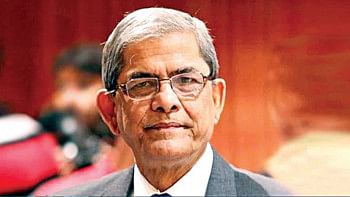Cancer causes 12% of deaths in Bangladesh annually: BSMMU study

Cancer is responsible for 11.9 percent of deaths in Bangladesh each year, according to a new population-based cancer registry by the Department of Public Health and Informatics (DPHI) of Bangabandhu Sheikh Mujib Medical University (BSMMU).
With 38 different types of cancer prevalent in the country, lung cancer (11.4percent), laryngeal cancer (8.5 percent), and stomach cancer (5.7 percent) are the leading causes of the deaths, the study reveals.
The study reports a cancer prevalence of 106 cases per 100,000 people, with 118 cases per 100,000 among males and 96 cases per 100,000 among females.
These findings were shared today at a dissemination programme at BSMMU's Super Specialised Hospital in the capital.
The event, titled "Cancer Burden in Bangladesh: Evidence from a Population-based Cancer Registry," was organised by BSMMU.
Md Khalequzzaman, associate professor of the Department of Public Health and Informatics at BSMMU and principal investigator of the study, presented the findings.
The study was conducted in Hossainpur upazila of Kishoreganj, with data collection beginning in July 2023.
Researchers conducted face-to-face interviews at every household using web-based National Cancer Registry software.
A follow-up conducted from July 1, 2024 to January 14, 2025 covered 58,539 participants from 3,411 households.
A total of 201,668 participants from 46,631 households took part in the study, with 48.4 percent being male and 51.6 percent female.
The study found that the total number of cancer patients was 214. Of them, 92.5 percent were aged between 18 and 75 years, while 2.4 percent were below 18 years, and 5.1 percent were over 75 years old. Researchers identified 38 different types of cancer among the study population.
The five most common cancers were breast (16.8percent), lip and oral cavity (8.4 percent), stomach (7 percent), larynx (7 percent), and cervix (5.1 percent).
Among female cancer patients, 19 percent had cancers related to the reproductive system, including cervical (11 percent), ovarian (5 percent), and uterine (3 percent) cancers.
The researchers found that 46 percent of all cancer cases were linked to tobacco use, with 75.8 percent of male cancer patients being smokers. Smokeless tobacco was consumed by 40.5 percent of males and 60.6 percent of females.
The study also found that comorbidities among cancer patients included hypertension (17 percent), diabetes (11 percent), cardiovascular disease (6 percent), chronic kidney disease (3 percent), and stroke (2 percent).
Regarding treatment, 60 percent of cancer patients received a combination of surgery, chemotherapy, and radiotherapy, while 7.4 percent did not receive any treatment after diagnosis, the study reveals.
The number of new cancer patients recorded in a year was 52.9 per 1,00000 people.
BSMMU Vice-Chancellor Professor Md Shahinul Alam chaired the event, while Professor Md Sayedur Rahman, special assistant to the chief adviser for health, Professor Syed Zakir Hossain, line director (NCDC) of DGHS, and Professor Md Atiqul Haque, chairman of DPHI at BSMMU, among others, spoke at the event.


 For all latest news, follow The Daily Star's Google News channel.
For all latest news, follow The Daily Star's Google News channel. 






Comments